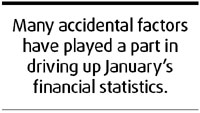Factors behind record-high figures
Updated: 2008-02-21 09:40
The People's Bank of China, the central bank, last week released statistics on the January performance of the financial institutions. All the figures had one common indicator: the economy "is over-heating".

M2, the broad measure of money supply, rose 18.9 percent from a year earlier, and compared with 16.7 percent in December. The financial institutions granted a record 803.6 billion yuan ($111.9 billion) in new loans in January. That is 237.3 billion yuan more than for the same period last year. The outstanding value of the loans hit 26.97 trillion yuan, up 16.74 percent year on year.
The public became more concerned about the country's economic performance in November last year after the authorities amended the monetary policy from "steady" to "tight".
The financial indicators in November and December last year showed both new bank loans and money supply had stopped rapid growth as a consequence of the new policy.
Against this picture, the record high growth in new bank loans in January is seen by many as proof the policy is not working well. And some have even urged the central bank to further tighten the policy by raising interest rates again.
Following the announcement on Tuesday that January's consumer price index (CPI) had hit 7.1 percent, the worst in 11 years, these people would probably cite it as another factor to back their suggestion.
However, a detailed analysis of the figures indicate that there are several accidental factors behind these record-high statistics, which make them less reliable to mirror the real economic performance. So they should not become the basis for tightening the current policy.
One of the most important factors is the date of this year's Spring Festival. Before this annul holiday, most people spend more than usual on food, clothing and presents. Thus, money supply increases remarkably.
Last year's Spring Festival fell on February 18, and this year on February 7. Thus, most consumption for the festival took place in January as compared to February for last year's festival. So it is natural for the money supply to witness a remarkable rise.
Another factor pushing the money supply up in January were the snowstorms hitting central and southern China. Huge sums of money have gone toward disaster relief.
The central bank also issued an emergency notice requiring financial institutions to respond to applications for loans from the disaster-hit regions. These new loans and money needed for disaster relief and reconstruction were prominent factors too driving up money supply growth.
The tight monetary policy put into effect last year had slowed bank credit growth making it difficult for businesses to obtain loans.
And as the year of 2007 came close to its end, most commercial banks had ran out of their credit quota, which also made them unable to grant loans. So it became difficult for many businesses to get loans they need.
After the new fiscal year began in 2008, businesses who had to wait in lines could now get their loans. And the banks are also more than glad to do so, after all the loan is the source of their profits. It also explains the eruption of the new loans in January.
Hence, it is clear that many accidental factors have played a part in driving up January's financial statistics.
Such a conclusion can also be proved by calculating the figures for December 2007 and January 2008. The average growth of M2 in the two months is 17.83 percent, the average growth of M1 is 20.87 percent, and the average growth of new loans is 16.42 percent, none of which is higher than that in November 2007.
It is, therefore, an invalid judgment that the economy had become "unusually heated" in January. The authorities must pay more attention to accidental factors behind elevated figures when they select policy tools to regulate the economy.
As a matter of fact, it is vital policymakers make decisions according to real time changes in the economic indicators, especially against the backdrop of a tight monetary policy.
It would not be wise to raise interest rates simply because of the unprecedented CPI growth. When interest rates are raised time and again, it only makes it more costly for manufacturers, and this pushes prices even higher and the CPI growth more out of control.
Since the economy is currently lopsided in its structure, a more substantial cure lies in the adjustment of the financial policy. Financial arrangements specially tailored to the current situation would help ease the problem, like subsidy to farmers in regions hit by the snowstorms.
The author is an anchorman with China Business Network, a TV network based in Shanghai
|
||
|
|